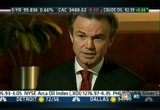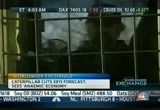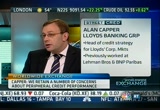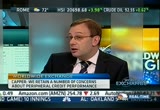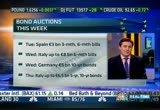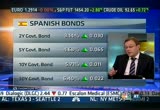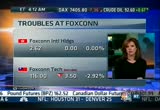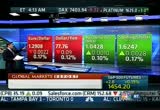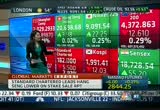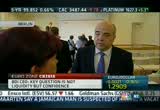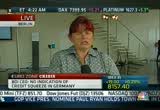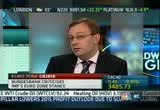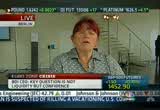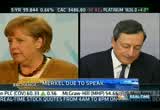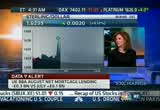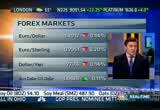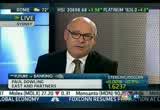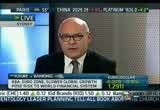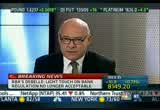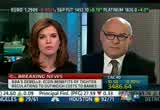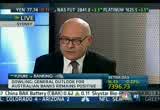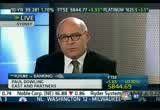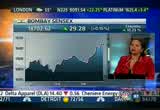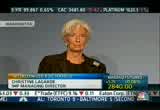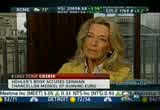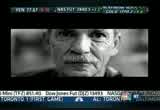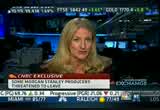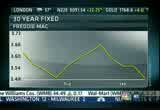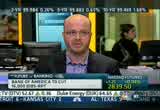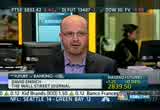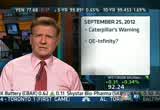tv Worldwide Exchange CNBC September 25, 2012 4:00am-6:00am EDT
4:00 am
. welcome to "worldwide exchange." these are your headlines from around the world. >> another nervouses day in the marketsfuling a worning fr iwar caterpillar cuts it forecasts. standard chartered shares slip. the financial times says singapore state investment firm may unload its stake. >> and we'll be in berlin where draghi and merkel are due to address german business leaders amid sharp criticism from the
4:01 am
bundesbank. good morning to you. we have two hour of the good stuff coming up here on world wide exchange. i'm loving the done best bank. keynesians and monitors. and they call them the inflation maximizing fund. >> and it does illustrate more broadly the tensions here. >> i think it's great. spraying money around like confetti. >> yeah, they're not fans there in berlin. they think the imf has been going beyond its mandate and acting too much like a bank. meanwhile in washington, they're not pleased because they think the imf is stepping up and do the work that they would rather see germany do. >> we're r. we just like to be pragmatists. coming up, we'll go to berlin
4:02 am
where angela merkel is about to speak. >> and then over to new delhi, business travel is giving a boost to the hotel business. chairperson of park hotels will be here. >> and sydney, the rba has warned its banks to be wary of the fallout of the eurozone debt crisis. >> and name dropping in new york. we hear from a morgan stanley executive on how their name change will impact the brokerage business. >> are we going to enough places around the world for you today? sydney, berlin, india, new delhi, new york -- >> and there's more to come. >> first, though, the imf says it will cut its global growth outlook. speaking at an event in washington, d.c., christine lagarde urged policymakers to take decisive steps to secure sustained economic growth. >> this time what we need is not
4:03 am
just a bounce. we need a sustained rebound. sustained rebound. not a bounce. if this time is to be different, we need certainty more than uncertainty. and we need decision makers to turn into action taker. which will require courage and the ability to rise above the short term agenda of the domestic boundaries. >> meanwhile caterpillar has cut its earnings forecasts for 2015 citing a slower than expected economic recovery. it's often seen as a barometer for growth. and it warned of a worse than forecast drop in demand. and you can see shares after hours shedding greater than 2% in the u.s. joining us now is alan capper at lloyds banking group. there's plenty to cover this morning. and just keying off this
4:04 am
caterpillar news, if there's concern about the health of the global economy, someone forgot to tell the credit markets. >> the credit markets have been tightening because there's been a big imbalance between demand for credit bonds which is growing rapidly in the eurozone and supply which is shrinking. >> just how frothy have the markets become? what are the metrics to you? >> it's very hard to specify where is fair value. in a market driven by technicals rather than fundamentals, certainly our target is 100, but the key is once we get in to 2013 and we're at 100, what happens then. my feeling is we probably go through even tighter still. >> isn't there a sense for which the demand for credit is actually more a reflection of weakness than strength in the
4:05 am
global economy? meaning to some extent, it's a reflection of the risk off attitude that's keeping yields super low and a lot of more investment grade products or certainly core sovereign bonds and basically when people push them into riskier products. >> the problem is the pensions schemes across the eurozone are still growing at exactly the same rate, if anything actually faster because yields are low. so they need to hold more bonds to match the coupon schemes. >> so the pension funds might be holding more of these bonds? >> in a way, the next crisis is probably the pension crisis. somehow or other there are byproducts. one is low kreeyields. >> regulators keep saying because of the low yield
4:06 am
environment, buy more bonds because they now have a pension deficit. that's nonsense, of course. what's happening on the corporate side? they're awash with capital. are we also getting less issuance and how much more money do corporates need to have? >> what's interesting is the eurozone credit market is shrinking year on year which is the first time it's done that for a long time. there's not only less issuance, there's less coming out to meet, retiring effectively. corporates as kelly said earlier, the economic outlook is not rosy. the motivation to carry out m&a activities is relatively low. so i expect the trend to continue. >> and the quality they're issuing isn't all that great either. >> the good quality have all the cash they need. so, you know, they don't need any who are. >> most of them have the cash. i think the good quality
4:07 am
borrowers can borrow really easier. there's huge 2k3457demand for h the spreads are tight. >> angela merkel and mario draghi are both delivering speeches in berlin today. organized by the bdi which represents large and small enterprises, the day of industry is intended to encourage dialogue. >> meanwhile spain even scheduled to auction up to 3 billion euros in three and 6 month t-bills today. those results due shortly after 10:30 a.m. cet. italy will be selling up to 8 billion euros in 6 month bills tomorrow. thursday we have an auction of 5 year and ten-year bonds. i don't know where to go with this one, alan. we're just waiting for spain really aren't we to decide when and where and how they tap if
4:08 am
they decide to tap -- >> look at the market yesterday. relatively quiet. bad news on the iphone, did stocks bounce, no, they didn't. can they rally? probably not easily because the resistance levels are overstretched. rajoy has played this really well. he wants to avoid losing the next election and therefore he wants to avoid asking for a bailout. the problem he faces is that at current yield levels, the spanish budget is not that sustainable. he probably will have to ask for a bailout. the market wants to see that. >> surely for the reasons you've just talked about he's going to push as far arms as he possibly can. >> but we'll be trying to get some inkling from what he's saying. from his point of view probably the best thing to do if he is going to ask anyway, get it over with and then at least the yields come down and he gets a chance to rebuild his
4:09 am
reputation. >> how significant is this sense that germany may test the legality of the permanent bailout fund, the esm, these stories getting traction this morning. is that -- how does that fit in as we look toward the end of the week as we look forward to some of the risks around whether the ecb plan and ultimately this kind of eurozone rescue plan is going to work? >> the market is very uncertain partly because of the tail risk brought out by germany's tests like this and secondly there is no coherent framework of european policy making whereas in the u.s. and uk elsewhere, there is a coherent policy framework. you may not agree with it, but it's coherent. my take is draghi is going to do this anyway and ask for the bailout, and that's why i say on the three to six month view. >> august and into september has
4:10 am
been about mitigating a large chunk of tail risk. >> if you look at the pricing of equity now and pricing of credit, that's what the markets are telling us. he's clearly not trichet. trichet is very responsive. draghi i think is ahead of the markets. what i like about his policy framework is he announces so much of a series of policy measures but always keeps something in reserve to give the markets more fuel next quarter, next year if necessary. so i think he's doing a very good job of controlling the markets. >> so you think he may have something else up his sleeve longer term? >> absolutely. he can go further. and also he's never yet announced qe. the market knows that would be the most positive factor of all. and by not announcing it, we can still speculate it about it and that's what's keeping spreads tight. >> i'm sure hers dreaming up new initialisms as we speak. the pboc has pumped $46 billion
4:11 am
into the country's banking system. china's central bank is trying to stave off another quarterly liquidity crunch. that's when lenders soak up funds to meet capital rules. it underscores the preference to boost the economy through open market operations instead of cutting the he reserve requirement ratio. and tjapanese coast guard vessels fired water cannons. taipei says the islands belong to them. meanwhile, media reports say south korea has refused to to allow a japanese warship to dock on its ports. ties between the two nations have also been strained over a separate territorial spate. foxconn is back up and running today..
4:12 am
foxconn is back up and running today. fox cop oig is stiinvestigatinge incident. the plant makes parts for the new apple iphone 5, but a spokesperson says supplies haven't been affected. shares down almost 3%. meanwhile here we are, just over an hour and ten minutes into the trading day. pretty even stevens. if anything, advances just about getting the edge over decliners. foot city 100 down a quarter of a% yesterday. right now up ten points. flat for the xetra dax. down six for the cac 40. ibex up a third of 1%. we'll show you where we stand
4:13 am
with bonds. treasury yields have got back to levels we were before the qe fed. 1.7% is where we stand. italian yield slightly higher, but more or less where we were yesterday. ten year spanish yields a little bit higher again. remember euro-dollar going down towards 1.29. still pretty much on that level. so haven't moved a lot in the last 24 hours. aussie dollar still on a 1.04 tack. and sterling-dollar still trading 1.62, pretty close to the year highs for that particular mark. so steady day right now here in europe. let's get a recap of the asian session.
4:14 am
>> yet another lackluster day of trade for asian bourses as concerns about global growth continued to weigh on sentiment. banks were under pressure as rates climbed to a seven month high, but developers and alcohol producers bucked the trend. the yuan gained strength against greenback but oil companies tapered off but pulling back a little at the moment. hang seng actually ended about flat. industrials countered by gains in consumer goods. standard chartered shed nearly 3%. nikkei recouped early losses to finish higher by about a quarter of a percent. steel makers and shipping firms showed weakness. investors have incentive to hold stocks until september the 30th in order to get midterm
4:15 am
dividends. elsewhere the kospi was dragged lower by health care, tech shares and steel makers. s&p also lowered south korea's 2012 gdp forecast. meanwhile miners again took the shine out of the australian market with a benchmark asx 200 losing about 0.3%. back to you. >> thanks very much for that. here in southern europe, people are cutting back on their coffee due to to the economic downturn. consumption is down in italy and spain to levels not seen for the past five or section years and that in turn is driving the price of coffee lower. this according to the financial times today. it makes us wonder what do you cut back on in economic times, tough economic times some do you still need your daily caffeine boost? two pounds a day going out for a latte every morning can add up. join the conversation here on "worldwide exchange."
4:16 am
you can e-mail us, fwooet us @cnbcwex or reach us directly. actually, on wednesday, we have an exclusive interview with twitter ceo. what do yyou want to hear from him in use the hash tag ask twitter. your questions will air wednesday. now over to ross. >> forget the coffee fix, join the tea revolution. that's what we say. after the break, we'll be heading out to berlin where angela merkel is set to take the stage. bob... oh, hey alex. just picking up some, brochures, posters copies of my acceptance speech. great! it's always good to have a backup plan, in case i get hit by a meteor. wow, your hair looks great. didn't realize they did photoshop here. hey, good call on those mugs.
4:17 am
4:19 am
4:20 am
>> she says she supports draghi and is happy with his politics. one may wonder how they fit together, but merkel keep insisting that both is the case. how happy is german industry with what's happening with the ecb and politicians at the moment? well, we talked a little earlier with one of the managing directors of the bdi. and he said they're quite happy with the ecb having bought time and they're confident the pressure will be kept on and doesn't see from his members that there's a credit squeeze right now. but hear it from himself. >> what i hear from germany, there is no intention for a credit squeeze. and i think if i may paraphrase what you've said, the question is not do we have to complete
4:21 am
new system, but confidence. and the confidence is what makes or breaks this game in europe at the moment. >> clearly the ecb has bought time it for politicians, not for the first time. but i'm a little bit of a trade when i talk to politicians just coming back from cypress thank you for the ecb, now we can do everything right, now there is not such a great hurry. is that the peer that maybe the ecb by buying time is also taking the pressure off the politicians to do their job? >> i think this would be a very untrust interpretation of mario draghi's policy. he was very adamant that this was an incentive for government in troubled countries to use the time and the regained confidence to introduce more structural reforms and i'm sure he will be more outspoken in the coming weeks and days about the
4:22 am
necessity of national governments to use the time, to use the window of opportunity to deepen and enhance the structural reforms that are so can desperately needed. in all of the eurozone in order to regain world market and increased competitiveness. >> so industry rather happy with the way it's playing out right now. but we've heard other voices where they've said there's too much money circling around in the banking system. with a we need is confidence injection rather than liquidity injection and that can't just be bought by flushing the banking system with money. >> silvia, stay there. the central bank meanwhile as you say been criticizes the imf, accusing the fund of watering down and overstepping its mandate. lawyers from both sides are
4:23 am
looking in to the legality of mario draghi's bond buying program saying the issue could be referred to the european court of justice. neither side commenting. alan, let's bring you back in. silvia is still with us, as well. is there a right side of the argument between the imf and the bundesbank? or not? >> i don't think there is a right side. we're dealing with policies that are not tried and tested. the over the empirical evidence we've really got is japan which is a very different economy to anything we see in the eurozone and it's simply not a currency union. on the one hand they were the individuals who are very concerned about trying what looks like a very dramatic policy. on the other hand the bundesbank is focusing on inflation. in many ways their mandate dictates the way they will behave and that's right and
4:24 am
proper. >> silvia. >> in terms of when ecb policy stands, i was let's say mildly surprised that everybody is just full of praise and doesn't see the pitfalls of it or doesn't want to focus on the pitfalls of it. i wonder whether the ecb is not putting itself into a path where we can't disentangle themselves from political -- from a political agenda anymore. they're now saying we will only dispense bond buying to countries in need if they embark on certain political programs. politicians are quite happy about that because the ecb is inverted to doing dirty work. but should the ecb be happy with it? >> it's hard for the ecb just to give funds out to the periphery without any strings attached. otherwise there will not be a structure reform and therefore the long term issues surrounding the competitive position will
4:25 am
never be addressed. so my sense is the ecb is trying to come up with the best long term policy with the short term restraints. >> we talked so much about the periphery versus the core, but are we seeing a weakening given what we saw in the ifo survey yesterday and some of the weakening in the core countries that could trigger a rerating of yields at these levels? >> this is the key issue which the market is latching on to. and it's true in never land ned france. france in particular. the government is kind of going the other way from structural reform and the market is realizing how do we justify fundamentals. in the netherlands, the leverage in the household sector is very, very high. commercial property is somewhat
4:26 am
over iinflated and it looks lika microcosm of the uk in certain respects. very tight spreads. how could this be justified. >> silvia, what was the reaction of the bdi to the ifo survey? >> what you get out here, they're still relatively confident. order books are still quite full for the large part of industry. and they're going still at full steam. the concern is more about how we're tackling these issues for the future. there is still greater concern about whether the pressure will be kept on with politicians and whether they will actually come up with the kind of structural reforms that are needed. so that's the biggest question mark out here. >> all right. thanks for that. is that a stairway to heaven or hell? >> that is open to debate.
4:27 am
4:29 am
sleep train's inventory clearance sale is ending soon. save 10%, 20%, even 35% on a huge selection of simmons and sealy clearance mattresses. get 2 years interest-free financing on tempur-pedic. even get free delivery! sleep train stacks the savings high to keep the prices low. but hurry, the inventory clearance sale is ending soon. superior service, best selection, lowest price, guaranteed. ♪ sleep train ♪ your ticket to a better night's sleep ♪
4:30 am
another never us day in the marketings following a warning from christine lagarde. caterpillar cuts its forecasts. >> standard chartered shares slip in london and hong kong. financial times saying singapore firm temasek may unload its stake. >> and merkel and draghi are set to address business leaders among sharp criticism from the bundesbank. august gross mortgage lending 6.9 billion. that is a contraction from july's 7.1. consumer credit also
4:31 am
contracting. minus 0.3 billion. same as july. consumer credit is contracting. mortgage numbers also going the other way. >> it's interesting to see the actual number of approvals was up from august to 59,000 from 56,000. so that's probably a lag between approvals and lending or perhaps at the reflects the implied valuation. >> although the olympic thing, did that stop people applying or asking for credit and they just said we're out of -- maybe that was that impact. >> take it with a grain of salt. >> european equities ahead of the u.s. open, we are pretty dispassionate really. the ftse 100 just up over a 10th, third for the cac 40 and up around just over a tenth on the ibex this morning after slim falls yesterday. >> we'll check in on bond
4:32 am
markets because it really is the spanish ten year that's the one to watch. drifting a little higher barely. italy at 5.16%. this is consistent with levels we've seen over the last couple of trading sessions and ahead of a lot of activity later this week. ten year german bund that is lower 1.54%. >> currency rates not much changed from this time yesterday. euro-dollar still just above where it was yesterday. dollar-yen 77.74. aussie dollar still trading with a 1.04 handle against the u.s. dollar. >> australia central bank is telling the country's lenders not to roll the dies on riskier loans. the rba says australian banks are in a good position to stave off threats from the european debt crisis and global slowdown. still the central bank warns it's not the time to drop lending standards. shares in australia's major banks finished mixed.
4:33 am
a few lower in the settle. paul dauling joins us now. should we be worried here about the vulnerability of australian banks as we look to how deep a slowing china may experience here and just more broadly after we've learned that australian banks supplanted europe to become the third biggest in the world? >> fundamentally both the reserve bank of australia and the imf have given them an a grade pass. the concern expressed is to not lower the any chase for market share in an environment where credit growth is pretty flat. >> is there a sense that a chase
4:34 am
for market share is when at's happening today? >> not really quite the case. there's been competent it difference activity certainly in the local deposits market where the banks have looked to rebalance the way in which they're funding their lending box, but credit standards are pretty well regulated by the industry regulator. all be shave pretty much in the same ways. fundamentally they're all pretty much the same. >> interesting here of course we're getting comments from the assistant governor of the reserve bank of australia literally right now, he's saying basically light touch regulation is no longer acceptable and the
4:35 am
economics will outweigh the cost to the banks. but he's arguing the indicate for tighter regular lig. with tighter regulation comes less profitability. >> well, certainly that's the length. they've talked that theme for some time. levels of core capital is relatively high. so that level of supervision won't lighten. we can only expect that to continue. the bank's response has been to really watch their funding costs. they on the one hand have sold about $50 billion in bank bonds into the international markets over the last six months at pretty attractive spreads. bond spreads are reducing. but on the other hand, the cost
4:36 am
of domestic undertaking has increased. it's all about margin for them. and they're all turning as a result of those dynamics to the cost side. so cost efficiencies across all four of these. >> i'm curious where the vulnerability strikes you as greatest. is it the corporate side? now we're seeing a lot of big names pulling back on cap ex. or is it the household side where we've heard concern over the years about a housing bubble. if property prices aren't continually assumed, is that area more one to be watching? >> it's a bit of both.
4:37 am
there's toughly $200 billion worth of committed in the pipeline. that's stuff that with not be turned off. as orders start reducing in the australian resources sector, it will have a trickle through effect and we're starting already to see signs of some pressure around the money services space, suppliers and contractors, to the big meaning houses. there is definitely a two speed economy. anything exposed to the high aussie dollar is currently stressed. sour richl, for example. >> explain that. >> if you look at any business
4:38 am
exposed to the high aussie dollar such as tourism, they're certainly going through structural readjustment. so it's a function of how you segment the market. we have a two speed view. mining versus the risk. but inside the risk, there are pockets of growth and pockets of decline. >> and who does that leave best position in your view? >> in terms of the banks, we had a forecast for business credit growth for the next 13 pnts of sub 3%. the bank's best position in that market currently would certainly argue be the national australia, january bank. they are the 800 pound gorilla. they have the greatest exposure to any business credit uptick. >> paul, thanks very much for your time today.
4:39 am
>> rbs will be worse than initially expected according to several reports. 3800 jobs are to be cut. the bank is on its way to becoming between and that the reinstruction should be done by the end of 2013. he's mentioned the bank is getting closer to being able to offer dividends. >> temasek holdings listing its stake in standard chartered. the newspaper says it had been mulling a sale of its 18% stake in recent months. shares trading lower on that news. >> park hotels in india is tapping in to growing domestic demand. it will expand operations launching its first mid market four star hotel.
4:40 am
it operates five star properties across ten cities which mainly krc indica cater to domestic travel. one of the ongoing stories we're interested in is the continuing development of middle classes. and in your view, whatever's happening with mistakes on government policy, is this a story that stays intact and unstoppable? >> yes, i think so. even though you say india drop to go 5 po.5% in growth, we hav growing middle class and we feel that's a great story for us for the next 15 to 20 years and that's why we've gone into these four star budget hotels.
4:41 am
>> how important are the big bang reforms? walmart is starting to get into the country. is this overdue, is it a game changer? >> i think it's a good signal. it really depends on how each a state enacts their legislation. i think it will change a lot of our supply chain. >> what changes do you anticipate? >> i think a lot what happens now, farmers produce stuff and it doesn't get in the stores in the right time to get the right prices. and one of the hopes is that that core chain supply will rationalize and there will be more infrastructure.
4:42 am
>> supply side has been so important in india. >> let's get to that in a second because the spanish t-bill auction the yield is higher than in august. 1.25% versus 0.98%. they sold 2.5 billion six month. and again the yield higher. so was the end of august the low point for spanish bond yields in response to what we thought was coming and had had? so slightly higher yields in spain. we'll keep our eyes on reaction to that. let's just come back to you for a second. what is interesting, you're going from five star to four star, which suggests there is a
4:43 am
growth of people who have some extra money to spend. what is that market like and what do they want? >> it had been largely unstructured so far and i think that's happened in india is aviation has really boomed. and that's got new travelers into the i said i can't market. they're all using tourism products. >> this is domestic. >> domestic travelers. so i might be going to a pilgrimage or with friends and family to celebrate a birthday. so traveling for the sake of discovery and the sake of just leisure has really grown. and there is that disposable income. >> just the sense of going away
4:44 am
somewhere for the weekend? >> yes. and a multitude of products have opened up to cater to this market. and we have websites and third party websites which are now advocating the products and market to go their -- >> all the spinoffs as that market develops. >> hotel bookings and travel bookings are one of the largest internet purchases in india right now. >> is there a sense that the supply side that people worry that holding back i said i can't from realizing it potential are starting to fall or do you still feel like there is a significant hurdle to doing business? >> it's still undersupplied. we have only about 130,000 certified hotel rooms. so if you're coming ins as our company on the international company, this is the time to do
4:45 am
it because we have 5.5 about% gdp growth, but that's like a slow down for us. actually we should be at about 8% or 9% and if you go back to that in the next two years, i think we just will need more from product. >> thanks very much for that. let's do a recap of those auctions. yields a little bit higher on the three and six month t-bill auctions. higher in september than they were the end of august. big box stores top asian executive in delhi says he welcomes the change in policy.
4:46 am
just listen in. >> wate're pleased by this initl step and i think that the conditions are certainly a compromise to ensure that many of the assumptions and more than retail can be proven. for walmart obviously the back end investments is an area where we have a lot of experience. >> the earliest we could perhaps see a walmart store open in india is about 18 to 24 months. that would be a safe estimate in terms of the time line. i know you don't have a blueprint in terms of your store roll out here, but give me a sense of what we're talking about. are you looking at a mix between big box stores as well as maybe hood formats? what would really work for you in india? >> i think that the first step that we obviously have to go through is to meet the state approval requirement. so the fdi has announced things to each state that has a city with a population greater than
4:47 am
ten that we go through the approval process. so i think what he's referring to is that generally the pipeline for modern retail is anywhere between 12 to 24 months fending on the size of box. in terms of the specifics, it's still a bit premature to start talking about those levels of detail. >> when do you start seeking approval from the state governments that are onboard and in terms of your current joint venture, that is for the cash and carry part of the business. are we to expect that this will naturally carry forward to the front end, as well? >> first let me talk about the cash and carry and the wholesale. we're pleased with that joint venture. the fact is that we have built a solid business, we expect to grow it and expand it.
4:48 am
so i see decades of peaceful company existenco co-existence as it were. it's a different service proposition. in terms of next steps, i think the rules are clear and we'll begin the process of seeking approval state by state and from there begin to stein what we see as being the natural back end investment that would support the level of front end retail that has been allowed. >> but what about your arrangeme arrangement? current is cash and carry. as far as a joint venture for the front he said, when do you hope to sort the details out for that joint venture and is it going to be -- i know you've said you're not in talks with anybody else and this would be a logical extension to the front end, as well. >> yes, we are very pleased with
4:49 am
the joint venture that we have with bharti and it is a natural progression. in terms of chains to the structure, some of the conditions on fdi put a level of responsibility on to the foreign direct invest tore in terms of the back end, so we have to work through those details. but overall pleased with the relationship today.back end, so through those details. but overall pleased with the relationship today. meanwhile angela merkel is just starting to speak at that bdi conference. it's all in german. if she says anything of particular note of interest, we'll let you know. still to come, representatives from france, germany and britain are meet to go discuss the b bea/eads deal. we'll have more on that.
4:52 am
4:53 am
the newspaper. this is something that came out of the euro group meeting in cypress a couple of weeks ago and clearly play to go anybody who looks at the numbers. >> absolutely. and it's just another, 30 billion euros though is this latest estimate. really we have to wait and see what the troica report says, but at least we're getting towards the figures that analysts have been estimating since the second election here. 30 to 40 billion euros. there's no press here today, but the international press have picked up on the fact that there is this tension now between the imf and the government officials here in organizing these cuts. and actually that perhaps the imf is pushing for further cuts that the government not willing to provide. because the local media was suggesting that the imf was pushing too far in order to suggest that debt needs to be
4:54 am
alleged and that's what christine lagarde suggested, that these budget cuts won't be enough and the debt situation does need to be addressed. outside the imf and the eu, we have got the suggestion that they'll be given more time, but people i speak to here on the ground still saying they believe greece could be made example of as a lesson to other eurozone countries. and people here will take to the streets while the government try to find the cuts. big strikes tomorrow. the two biggest trade unions of private and public sector going to be on strike for 24 hours tomorrow. and actually as one taxi driver said to me, despite the fact this is the first general strike since the. >> analysts at morgan stanley say britain's deficit could earn the dubious title of europe's largest in the coming fiscal year. more on that on cnbc.com. this note has gotten plenty of
4:55 am
media attention at least in the last couple of days. if i could just rant for a moment here. the fact that britain's budget deficit is going to be larger than greece itself means nothing. yes, it points out there is still fiscal vulnerability, but britain also has its own currency, it's not part of a defunct quasi unified surps city block. so to simply compare it with greece doesn't seem to add much value at all. >> yes, but it's got noteworthy applause, hasn't it. not applause. it has notoriety. and we do think mervyn king's already given the green light for the government to loosen up its deficit targets. >> meanwhile the defense
4:56 am
ministers are reportedly set to meet over the planned $45 billion merger between bae and eads. our favorite name so far is beads. it's a warm and fuzzy name for a defense company. >> absolutely. beads. doesn't sound bad whatsoever. a little bit of a feminine touch there if you think about what you can put around your neck, but i i like it, too. the latest in that development is of course tomorrow tom enders will step into front of the german parliament to map out the kind of deal that we may expect from that merger. until now, all the governments involved, uk, u.s. as well as the french and german of course have come up with a lot of yes buts. meaning they're looking at trying to safe guard jobs and also a possible takeover and the golden share offered quite a few days ago, however it could be
4:57 am
getting in to problems when it comes into the eu competition wall. so we really have to see. perhaps tomorrow after that meeting, we could see more information. ross. >> all right. thanks for that, patricia. >> want to just quickly sticking with transport, take a look at continental shares, they're down now more than 4% in frankfurt trade, this after the company's major shareholder sold over 20 million shares at a price of about 77.5. a key test for the transport sector and for sentiment around autos in particular. >> merkel says she would like the european court of justice to monitor the fiscal pact. we'll take a short break. still to come, caterpillar's falling, but is it too slow. bob... oh, hey alex. just picking up some, brochures, posters copies of my acceptance speech. great! it's always good to have a backup plan, in case i get hit by a meteor. wow, your hair looks great. didn't realize they did photoshop here. hey, good call on those mugs.
4:58 am
5:00 am
another nervous day in the markets following a warning that the imf is set to lower corporate growth targets. >> and angela merkel says sharing debt won't solve europe's crisis. >> and president obama is set to address the u.n. general assembly in new york a day after inflammatory comments from ahmadinejad.
5:01 am
we're looking for a bit of a rebound after closing lower yesterday. dow jones trying to add about 10, 11 points here. nasdaq and s&p also looking to add here. but again, this follows a down day yesterday. but it was a monday, so what do you expect. global 300, we can focus in here on the european bourses because we were across the board same thing, indecisive attitude. ftse 100 basically flat. xetra dax 4/10 of a point. cac 40 down 0.4%, so not just germany. ibex 35 trying to add 0.3%. it did just auction off debt
5:02 am
paying a little bit more for those 12 month bills than last time. >> we did see as kelly rightly says yields slightly higher. spanish debt yields there also slightly higher. look at this, ten year u.s. yield now 1.69%. so we are back to the levels if not below the levels we were at before the fed announced another bout of quantitative easing. euro-dollar pretty much at the levels we were at this time yesterday. dollar-yen is weaker at 77.68. aussie dollar exactly the same. and sterling still in that 1.62 range. so haven't moved a lot in the last 24 hours. let's get a recap of where we stand in asia. >> asian bourses ended on a
5:03 am
mixed note. the shanghai com positiposite l 0.2%. banks were under pressure, as well, as interbank rates climbed to a seven month high despite the pboc's liquidity injection. but developers and outcore producers bucked the downward trend. meanwhile the yuan gained strength against the greenback, but oil companies tapered off. the hang seng ended flat. losses in industrials were countered by gains in consumer goods. standard chartered shares shed nearly 3% after the report temasek sounding out potential buyers for its stake in the bank. steel makers and shipping firms showed weakness, but difference depd pla dividend plays provided support. elsewhere, south korea's kospi was dragged lower by health care and steel makers.
5:04 am
country's gdp forecast 2.5%. meanwhile miners again weighed on the australian market with the benchmark ending lower by about 0.3%. sensex higher by about 0.3%. >> all right. thanks for that. angela merkel is speaking in germany at the bdi conference. it's an industry confederation. saying markets are worried about some countries repaying their debt, they're working on the the next step forward she calls more europe. and they want a stronger european banking supervision, but they don't want to get there too quickly. she's talking about germany needs to strengthen domestic demand. already signs that that is happening. is that a suggestion that they want to move away from the export led model slightly? >> they're seeing the
5:05 am
realization what they have to do, but and he can knowledging it as you say. also she's saying on supervision one cannot talk about recapitalizing banks in euro countries without requisite intervention. spain was lined up for a recap already implying there should be some conditionality even for that kind of event, but it does seem as though her comments about more europe are significant and we'll watch for any further developments on that. >> and of course this comes after we saw the great comments from the bundesbank calling it the inflation maximizing fund. those were private comments. and they talked about them spreading around money like confetti. >> not much love between the two institutions. >> talking about the imf, they've said it will cut its global growth outlook when it releases fresh economic forecast next month, citing a slower than expected recovery. christine lagarde urged policymakers to take decisive
5:06 am
steps to secure sustained economic growth. >> this time what we need is not just a bounce, we need a sustained rebound. sustained rebound. not a bounce. if this time is to be different, we need certainty more than uncertainty. and we need decision makers to turn into action takers. which will require courage and the ability to rise above the short it term agenda of the domestic boundaries. >> this as caterpillar has cut its earnings forecast for 2015 citing slower than expected economic recovery. the heavy equipment maker often seen as barometer in the u.s. and abroad has warned of a worse than forecast drop in demand. andrew wilkinson joins us how. andrew, good morning. >> good morning. >> so it's interesting, we have
5:07 am
this juxtaposition where imf, caterpillar, many companies ahead of the third quarter earnings season seems to be coming out with lower views taking down their expected earnings targets. and yet you guys seem to still see some room here for optism in markets on the back of what the fed has done. so is it the case of buying what the central bank is doing even though you're worried about the fundamentals? >> i think you've got to appreciate that night doesn't simply follow day in that regard. the federal reserve, bank of japan, ecb, have put in place measures to support global growth going forward. i believe that we've shaken off a lot of the icy conditions that hit over the summer and that looking forward, given the -- it's really a life changing event what the ecb has put this to place and i do believe looking forward things will be significantly better. right now, however, it does
5:08 am
appear that everybody is set to remove the -- they want to pull the rug from underneath growth. if you think back just six, september months, in the first quarter, everybody was very optimistic about growth in the u.s. people were asking why the federal reserve would possibly consider further stimulus. in light of what looked like strong sustainable growth. we hit an absolute brick wall at some point on account of europe. those headwinds to growth were ever present and we ran straight into them. so i think now given the water that's gone under the bridge, i'm far more optimistic about the outlook for next year. but in the meantime, there's just no sign of it. >> we're looking at the ten year, back below the 1.7% level. so are we already seeing whatever move the fed was going to give us here in terms of -- because yields have typically in the last couple bouts of
5:09 am
quantitative easing risen on better outlook here for the u.s. or even the global economy and now we're already seeing the softness back below the 1.7% level. does that not perhaps speak to the level that markets are starting to look through this? >> not really. i think you have a very good backdrop for inflation. if you think back to again just a couple months back, u.s. yields got back to 1.44, german yields down 1.11 perhaps on the ten year. and based upon so many fears for global growth on account of the eurozone. we he backed up kree nor musly heading into larger discounts. and if you look at the mbx market subsequent to the fed's decision a couple weeks ago, yields have come screaming off. i don't necessarily think that yields back under 1.70 on the u.s. ten year portend a big
5:10 am
downturn in growth. we had a huge jum t coming to normal. i wouldn't be surprised to see 1 1/2 on the ten year u.s. >> okay. interesting call. stick with us. plenty more to come from you. also on the agenda today in the united states, two key data points .at s. housing recovery. expected to be up 1% for july. and we'll also have the latest consumer confidence report, this is the richmond fed manufacturing survey due out at 1:00 eastern. also an auction of two year treasury notes. >> speaking of economic indicator, here's one for you. southern europeans are cutting back on their coffee due to the economic downturn. consumption is down in italy and
5:11 am
sman to levels not seen for the last five or six years. and perhaps in a silver lining for the rest of us, that's driving the price of coffee down. what do you cut back on in tough economic time times some do you still need the daily caffeine boost? two pounds a day really does add up. i know i'm equity of that myself. e-mail us or tweet us to respond to that or anything else you've heard on the program this morning. and speaking of twitter, on wednesday on cnbc, we'll have an exclusive interview with the twitter ceo. tweet your questions today using the #ask twitter. >> and angela merkel, we'll hear from an author who says the german choances chance chance c
5:12 am
rules like a mob boss. bob... oh, hey alex. just picking up some, brochures, posters copies of my acceptance speech. great! it's always good to have a backup plan, in case i get hit by a meteor. wow, your hair looks great. didn't realize they did photoshop here. hey, good call on those mugs. can't let 'em see what you're drinking. you know, i'm glad we're both running a nice, clean race. no need to get nasty. here's your "honk if you had an affair with taylor" yard sign. looks good. [ male announcer ] fedex office. now save 50% on banners.
5:14 am
5:15 am
assembly. >> angela merkel is speaking at the bdi industry conference and says she's worried that -- markets are worried, rather, that some eurozone countries aren't repaying their debt. working on the next accesteps f more. silvia is at that conference. what do you make of what she's been saying so far? >> anybody's worried about somebody not paying back their debt? no, a preposterous suggestion. i think what merkel reiterated and there was a great round of applause about that is basically what the german line has been all along. no trapsz fer of money without control and without checks and balances. that of course is along the lines of what we've heard all along. yes, solidarity for the euro, yes, we have to get confidence back in the eurozone and into eurozone economies, but we have
5:16 am
to do it the right way and that means reforms, reforms, reforms. yes, growth pact, as well, but no just money flows without checks and balances and without putting pressure on to keep reforms going. i think that was the bottom lean of the not surprising argument that angela merkel had today. and what we heard from the president of the bdi before was along the same lines saying the euro is a currency area that we all share and we all prosper in, but we have to save it the right way so to speak. and there's no easy way out. to just lean on the ecb that keeps buying time, we also have to implement the necessary reforms even though that is clearly the more difficult way to go about it. but it's the only right way to go about it. so that was the message that came here in the opening round of speeches. later on today of course we hear from mario draghi to explain, defend and reiterate what the
5:17 am
ecb policy is. interesting earlier we caught up with a professor who was one of the advisers of chancellor when he was in office and of course knows the cdu very well. she is part of the political political scene, but also published a well political book which points out and points the finger at the way angela merkel is governing and the way that she single handedly moved into the direction of keeping her on power base and expanding her own power base, but not necessarily strengthening the democratic institutions of europe. >> the consequence of merkel's
5:18 am
style in softening questions or answers that means you getner a clear or even a bad message. you get only the sentence when the euro goes in what would mean -- when the euro is corrupt, then we have corruption in europe. people think okay, understood, no questions. when she's in her press conference conferences journalists write and write and write with their notebooks and with their ipads and then they says it was last
5:19 am
year it was 2010 and it's 2012. it's fun for me to make this jump. >> never a bad message. that's what we're there for, for giving people the bad news. but the book is as i said very much debated. one hears that angela merkel knows the professor very well and wasn't pleased by this and has refused to read the book. >> i guess that's one way to deal with things that you don't like. silvia, thanks very much for that. and coming up at 3:00, we'll be looking to hear from mario draghi giving the keynote address to that event. 3:00 european time that is. >> the yield has come down from the end of august. it is again another auction we've seen the lowest since march. so maybe a little bit of
5:20 am
decoupling here. >> let's bring andrew wilkinson back into the conversation. we've been talking about europe. you had said earlier that you see it as one of the risk factors perhaps now out of the way for investor, but we continue to watch these events to see the headline risk and see a session like today where markets are just going nowhere. >> definitely a huge risk factor in the background. i've maintained for the longest time that once we get the headwinds of the eurozone out of the way, consumer confidence whether return and we can be looking again at 3% growth in the u.s. in 2013. >> we'll get into the details when we get back from the break. still to come, we'll talk to a morgan executive about the smith barney name change.
5:24 am
barney and being renamed morgan stanley wealth management. mary thompson sat down for an exclusive interview with greg fleming on the company's launch of its new ad campaign. >> this is the largest ever integration of two brokerages and it's been ripe with complaints. in an exclusive interview, fleming acknowledges the problems, but remains confident he can keep key brokers in the fold. i've spoken to a number of people and there were a lot of complaints about this integration in large part because of the problems associated with the new technology that was introduced. are those problems behind you right now? >> so takes new car. it doesn't have a lot of the bells and whistles that it needs. there are things like the longer statement, things that haven't worked as quickly as they need to for clients and for financial advisers. we're very aware of that and we're very focused now on making
5:25 am
sure that we add all of those features back to this new car and not all of it will happen in the first month or three months, but over time will add more and are more of these features so that it has the functionality that it need for these advisers and their clients. >> do you put a lot of credence in the idea that there could be some exowe can did you say frdu people because of the concerns about the system? >> we're listening very carefully to the concerns and issues and the things that they need to help us address in the technology. they have business has they've invested in and really they've built and they own the coverage of those clients for a long time. they want us to make sure they're helping nourish that, that we're not having clients saying they want to see a different statement, but they don't want to do it somewhere else. they want to be here. and i can feel that from talking to them. >> what is it that they want is this because there are also reports that some of them may bring lawsuits against more began stanley.
5:26 am
do they want different retention clauses, to they want bigger bonuses? >> they're not looking for any of those things. they're looking to make sure that the technology platform that they're working on works on a day to bay basis for them and for their clients. >> coming up later more of my interview. he talks about why morgan stanley wants to buy the 3 5% of smith barney that it doesn't already own yet sooner than the 2015 deadline. back to you. >> mary thompson there in new york. and still to come, meredith whitney says conditions for banks are as bad as she's seen it. we'll take a look at the future for the industry. that's just in half an hour's time. it take a look at u.s. futures. potentially a rebound. dow adding 17 points implied at
5:27 am
the open. reversing yesterday's losseses to some extent. bond wall also shows a level of caution. xetra dax, let's look at the ten year in spain, the yield up a little bit 5.77%. italy's nearly 5.2%. the u.s. ten year is below 1.7% this morning. and back over to andrew wilkinson. we left off, you were saying you still see the potential for 3% growth in the u.s. and i'd love to know how we get from here to wi there. >> that's pretty much where we were in the fourth quarter of last year and i think we can easily come back to it. we've had a very strong rebound in the manufacturing sector. low interest rates have done a tremendous job for the u.s. consumer both in terms of financing autos and as well as reducing mortgage rates and that's of course helped raise house prices and brought more
5:28 am
and more people out of negative equity. so the household balance sheet as bad as it got has incrementally started to get a little better. the real problem we're facing right now, though, is that unemployment is only coming down in small gains at the margin. we need to see more business and consumer confidence before employers look set to push the envelope with hiring more. >> maybe they see what happens post election fiscal cliff before we get going on that. how much of an impediment as well is oil and energy prices going to be? it's still high bearing in mind the weakness of the global economy. >> it's a straggling problem with gasoline prices over here. two months in the average price
5:29 am
of gasoline per gallon was what 2.44 and -- sorry, 3.44 now up to 3.84. and around the northeast here, we're paying well over $4 a gallon. so it is an impediment. it's only 11% of overall retail consumption. so i think we've largely gone over that sticker shock. we've become accustomed and i think consumers compensate for that in the wage packet. >> all right. andrew, stick around. more to come from you. we'll dig in to the housing market a little bit later. also still to come, we'll bring the latest on the education nation summit. >> and we'll preview president obama's speech at the u.n. general assembly.
5:32 am
5:33 am
after inflammatory comments on israel from iran's ahmadinejad. >> we're see something u.s. markets tick into negative territory. s&p 500 would still be opening just barely higher, but we're now seeing the dow for example adding about five points at the open. open are markets in europe and the ftse 100 just barely positive. it's been flicking between fwgas and losses. cac 40 down a 4th of a%. ibex 35 here trying, though, to stay in the green. markets struggling to gain some
5:34 am
traction and searching for direction. >> so what are investors to do? here's a recap from some of the experts already this morning. >> looking at relative value trades, we don't luike aussie a much. within the g 10 currencies, pick the one that will hike next. >> in the short term, we think there's still more opportunity for investors to return to european markets. most likely dax, we still like the dax. >> it's a french satellite business. so quality for us would
5:35 am
basically be barriers to entry and pricing power and the things that will allow you to sustain margins. so this is a business that has a fleet of about 51 satellite which is they're launching and coming to that the end of that launch schedule. so that's and a tough market t replicate. >> yes. we're sort of waiting again. >> we are waiting on -- what were we saying yesterday? spanish auction, french budget. always waiting on something. completely an event calendar driven trade here in europe. and when you're in these pockets where we don't really have much going on, you you can see what's happening in the markets. >> although u.s. data today is important. a key reading on the u.s. housing market. case shiller index released later this morning. diana olick has the details. >> new demand and short supplies both point to continuing price
5:36 am
recovery in the housing market. a key read, the monthly s&p 500 case shiller home price report out tuesday is expected to show even stronger gains in july than we saw in june. the report is backward looking, really a three month running average ending in july. but all signs point to bigger gains in a majority of the nation's top 20 housing markets as banks work very slowly through the large backlog of delinquent mortgages, hundred gli investors have eaten through supplies of bank owned homes. near record low mortgage rates over the summer also added to purchasing power which should play into higher sale prices. of course all real estate is local. in last month's report, six out of the top 20 cities were still seeing annual price declines. those were atlanta, chicago, las vegas, l.a., new york and san diego. these july numbers should round out what was a stronger than expected spring and summer for home sales. back to you. >> and it comes off the back of another rise in existing or
5:37 am
previously owned home sales in august. they were up 7.8% last month to hit a two year high in the national median house price also rose for the sixth straight month in august. prices up 9.5% for the same time a year earlier. andrew, we've seen this influence theed if fed's alread on mortgage rates. do you expect to spur more activity or is there a concern that we've reached the lowest levels possible given the mbs market? >> well, the mbs market has made great strides since the fmoc's announcement. mortgage rates have come off 25 basis points and that's where richard fish he said this is exactly what i expected to happen. one of his concerns was in surveying people around the state of texas business
5:38 am
respondents were saying they were unlikely to hire more or spend more on capital projects as a result of lower interest rates. but on the housing market specifically, yes, it will help spur demand, but we've got a very different problem. rising house prices great for those who own houses, but it's not so good for people who don't own houses. since the end of 2006, around 5 million more people have moved on to the rental side. so there are about 40 million rental owned occupied mortgages while the number of people in owner occupied mortgage units has come down by about 2 million. so it's all well and good to say that rising prices helps create demand on the recovery in the housing market, but it's no good for those people on the rental
5:39 am
side who find themselves eclipsed from the recovery. >> if thinking, we've actually seen some securitization of products based on those rental streams and i think that tells you to some degree just how much we've seen a shift there in the market. but nevertheless so andrew, is it your view that we have turned a meaningful corner when it comes to at least putting some sort of foundation into the housing market's recovery or wi will we look back at this at another false dawn? >> not convinced that the bond is in it for house prices. while i'm optimistic about growth for 2013, i think in the bigger picture, housing is still relatively expensive particularly if we continue to see declines in real wages. so i think we've turned the corner in the short term, but we said that last year about the state of the employment market.
5:40 am
and i think overthe first quarter, second quarter in 2012 certainly in this economy we saw that year over year pace of increase start to give way. and of course it's become a great worry and something that's caused the fed to act further. >> certainly. andrew wilkinson, thanks for all of your thoughts this morning. >> meanwhile u.s. cereal and snack food giant kellogg is betting consumers will wake up to their brand. the maker of corn flakes and eggo waffles is setting up a new joint venture to push its products in singapore. >> i have to get you some eggos to try. they're delicious. >> we have all the other kellogg products. >> i haven't seen them here.
5:41 am
>> when you get on shredded wheat, you'll be kicking. toys "r" us is being sued by fuhu saying it's stealing the strategy of selling the toys "r" us tablet closely resembles its own tablet. both are wi-fi enabled with a soft protective phone. the ceo of toys "r" us will be on "squawk box" u.s. this morning. >> they're hiring a bunch of people for the holidays. >> 45,000 which i think last time they had 40,000. >> and they usually keep a few on permanently. >> and more trouble in toyland. british based toy maker has warn order profits, the company says 2012 results would miss correct tagss partly because of disappointing sales of its olympics themed merchandise. numbers would also be affected by disruption in shipments from
5:42 am
a major chinese supplier as shares you can see down a third today. it's a brutal environment. their stuff hasn't blown up -- burberry had a huge two yid rea ride. >> on the great side, you can pick up cheap memorabilia. stick away, president obama set to take the stage at the u.n. general assembly in new york. we'll have a preview. bob...
5:44 am
oh, hey alex. just picking up some, brochures, posters copies of my acceptance speech. great! it's always good to have a backup plan, in case i get hit by a meteor. wow, your hair looks great. didn't realize they did photoshop here. hey, good call on those mugs. can't let 'em see what you're drinking. you know, i'm glad we're both running a nice, clean race.
5:45 am
no need to get nasty. here's your "honk if you had an affair with taylor" yard sign. looks good. [ male announcer ] fedex office. now save 50% on banners. southern europeans are cutting back on their coffee due to the economic downturn. cop sufrl sh down to levels not seen for five or six years and that's driving the cost lower. earlier we asked if you were giving up your coffee fix. rick e-mails in to say he's still making it a daily drink, but not quite as regular. phil says for quite some time many of us didn't second guess spending $5 for a latte at starbucks until we begin to realize this adds up to $100 a month. still he says, and this may be
5:46 am
telling, my coffee is mandatory to get me through the day and that's also the case with millions of americans. apparently not with ross, though. you can get in the conversation. e-mail or tweet us. and speaking of twitter, on wednesday, cnbc will have an exclusive interview with to wit are's twitter's ceo. >> tea. most offices have a kettle with teabags. it will save you a fortune. >> and i like the little plastic spoons you have over here, too. >> talking about drinks less coffee, we had a three and six month t-bill auction out of spain. we saw a low point in yields in
5:47 am
recent months in august the 28th. jeel yields across the spanish curve also higher during the session today. of course we wait to see what pressure that might put on rajoy in terms of asking for a bailout. interesting at the same time today we had a zero coupon bnd out of italy. we did see yields come down from the end of august. so a bit of a separation between what's happening in auctions at the moment for both italy and spain. >> imf set to lower growth targets. caterpillar warning slow global recovery. and tensions in the mideast due to take somewhere stage as president obama gears up to address the u.n. general assembly.
5:48 am
speakinging ahead of the general assembly session, he repeated a warning that israel would be eliminated. >> fundamentally we do not take seriously the threats of the attack on iran. iran is a great country and we do with v. all defensive means at our disposal. >> the white house was quick to dismiss his comments as outrageous. president obama is speaking at 10:00 a.m. he's also expectth expeed to ad tensions in iran before hopping back on the campaign trail. romney will also be speaking in new york. >> he's getting some criticism
5:49 am
5:51 am
meredith whitney says banks have been behind the curve in terms of downsizing and employees are paying for it now. >> if you think about all the other industries that have gotten more competitive, more profitable, the banking sector and insurance sector have been laggards behind it and they employ a lot of people. so they'll see significant layoffs. interesting for goldman, they're cutting all of their highest
5:52 am
paid people. so it's not a great time. i think the industry is as bad as i've seen it. >> so how bad is it going to get? joining us for more is bank equity research and european banking editor. welcome to you both. do you agree with meredith whitney, is it as bad as you've seen it and are there a lot more job cuts to come? >> yeah, i think it's pretty bad. i think it all kind of centers around what's going on with the eurozone. but more positively, i would say that historically whenever the bulge brackets start cutting people aggressively, it's the bottom of the cycle. i would say when the eurozone improve, you'll see the whole industry buounce back hard. >> normalizing has to continue here. >> but i would argue perhaps we've gone through the kind of where we need to be in terms of healthy amount of resource and we're kind of cutting into the
5:53 am
muscle, as it were. and potentially bounce back as things recover even though we have been in a super cycle that has come to an end. >> i think i kind of disagree slightly. and i think that -- i agree with the big ones like gold map, they'll need to maintain. i but a lot of banks downsizing are second tier banks.ma map, they'll need to maintain. but a lot of banks downsizing are second tier banks.n map, they'll need to maintain. but a lot of banks downsizing are second tier banks.map, they'll need to maintain. but a lot of banks downsizing are second tier banks.ap, they'll need to maintain. but a lot of banks downsizing are second tier banks.p, they'll need to maintain. but a lot of banks downsizing are second tier banks., they'll need to maintain. but a lot of banks downsizing are second tier banks. and it's unreal wlistiunrealist. certainly southern european companies like unicredit for some reason got in the big investment banking businesses. >> and it's a confluence of factors here. just the reality of what their return on equity targets are going to be. >> yeah, it's not as profitable due to regulations and due to the weak environment. and some of it is cyclical and i think will bounce back, but on the other happenend, the realiz is dawning on them they don't
5:54 am
have any business competing as giant wall street firms. >> they're going to cut over 3,000 jobs. what is the outlook at the moment for rbs? >> i had a buy on it until about a week ago and arguing that it was going to rerate based on the eurozone. i think at these levels it's more or less fairly valued based on old assumptions. but there's been a lot of research over the last 12, 24 months about the roe of the banks being single digit. yields on financial assets globally have come down. at some point people are going to take another look at the cost of equity for banks and i would argue that there's a good case to make that the cost of equity should shift down from let's say 10% down to 9%. and if that's correct and the eurozone holds together, there's another substantial rally still to come in the uk domestic
5:55 am
banks. >> is that for names across the board? >> my current up side if you believe the eurozone will definitely remain intact and also you're willing to give the benefit of the debt in terms of the cost of equity given that effectively globally central banks have gone all in with quantitative easing. imagine you're ben bernanke or mervyn king and you've just announced unlimited qe and risk assets start selling off. i would suspect they'll increase the amount of qe they're doing. so to some extent risk premium should come down. >>. >> it's hard to prove a negative. based on our reporting, we are not able to confirm, not getting
5:56 am
any indications that temasek is looking to sell its stake or that there would be any buyers even if they were. so we wouldn't have run that story. >> more bradley then what is the sense to his point about uk banks potentially having more up side, maybe the cost of capital comes down then, are investors missing a beat, are they too pessimistic? the risk factors here just stack up and stack up and stack up. >> my track record at predicting stock movement is just awful, but i would say one of the interesting things is just regulatory uncertainty. and we saw with standard chartered a month or two ago, barclays, hsbc, rbs seems like it's coming up soon. >> thanks for that. that's it for today's "worldwide exchange." "squawk box" coming up. >> we'll see you back here tomorrow morning.
5:59 am
good morning. today's top stories. caterpillar cuts its earnings forecast blaming a sluggish global economic recovery. qe infinity? a top fed policy maker suggests the central bank will expand it bond ayie i buying program next and end it before of close the 2014. euro crisis, angela merkel and mario draghi are in berlin today. it is tuesday, september 25th, 2012. squawk b"squawk box" gibbs righ.
206 Views
IN COLLECTIONS
CNBC Television Archive
Television Archive  Television Archive News Search Service
Television Archive News Search Service 
Uploaded by TV Archive on

 Live Music Archive
Live Music Archive Librivox Free Audio
Librivox Free Audio Metropolitan Museum
Metropolitan Museum Cleveland Museum of Art
Cleveland Museum of Art Internet Arcade
Internet Arcade Console Living Room
Console Living Room Books to Borrow
Books to Borrow Open Library
Open Library TV News
TV News Understanding 9/11
Understanding 9/11

